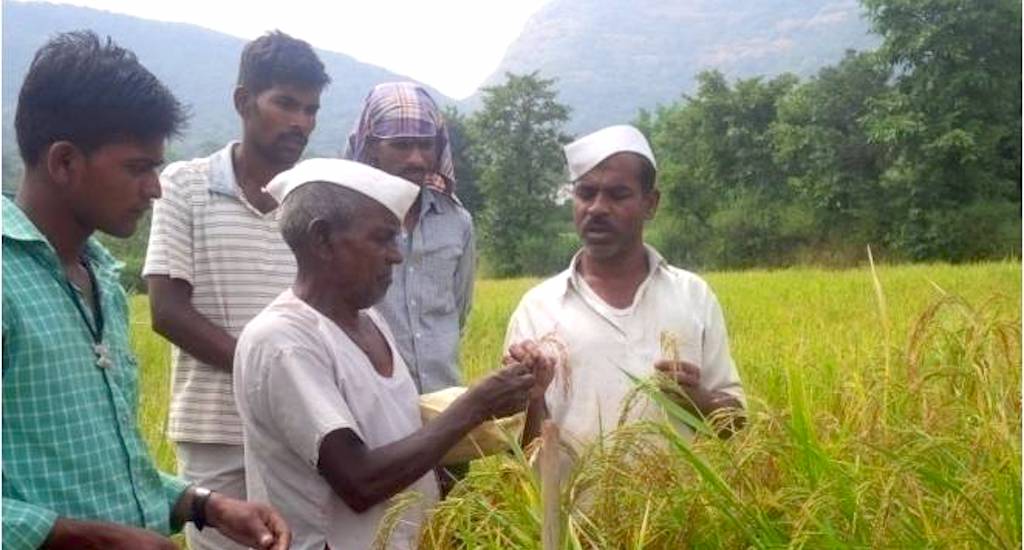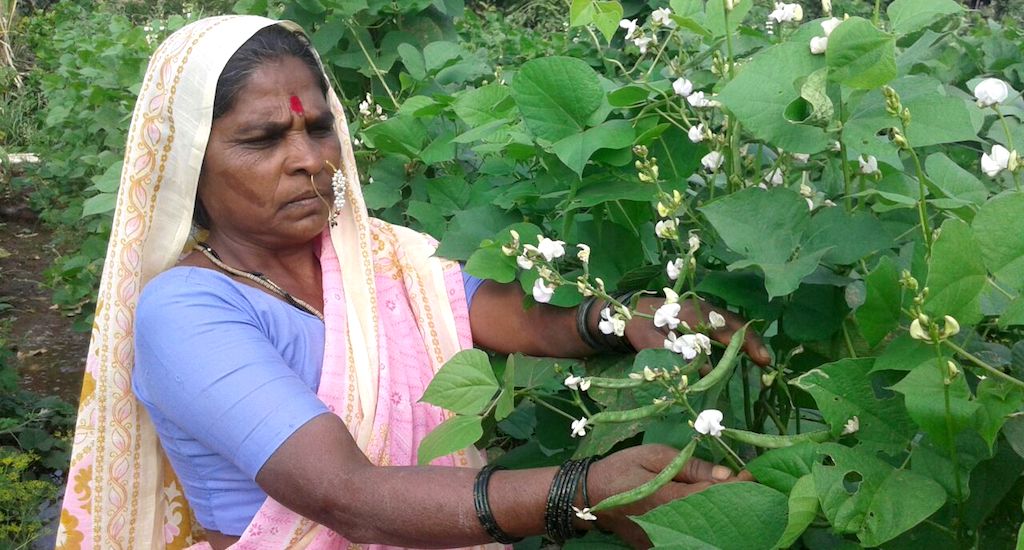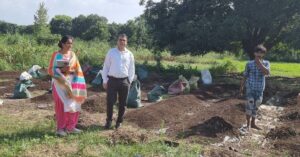Here’s How Maharashtra’s Farmers Are Proving Traditional Seeds Are the Best!
Recognising the significance of traditional crop varieties that can withstand climate-related vagaries and offer nutritional security, tribal farmers have started to conserve and propagate local cultivars. Hiren Kumar Bose takes a closer look.

Rahibai Soma Popere hails from Kombhalne village, Ahmednagar district, Maharashtra. She is highly knowledgeable about agrobiodiversity, animal breeding and innovative techniques in paddy cultivation. Her insights are based on experience. So when she speaks in her earthy Mahadeo Koli tribal dialect, even experts listen carefully.
The 54-year-old farmer has the distinction of conserving and multiplying 48 indigenous breeds of 17 different crops – including paddy, hyacinth bean, millets, pulses and oil seeds.
“Tribal households traditionally had a backyard garden that had multi purpose indigenous trees, plants, herbs, and shrubs. The produce from this small garden was sufficient to meet the food and nutritional needs of a family for an entire year,” Sanjay Patil of BAIF Development Research Foundation, a Pune-based NGO working among tribes in 16 states of India, told VillageSquare.in.
Wide variety

Tribes in Maharashtra cultivated 300 rice varieties. Each one of them was eaten for a specific reason – from nutrition to medicinal purposes. These native varieties were the result of years of dedicated efforts to develop and conserve crops suitable for the local conditions.
The green revolution had a profound effect on rice in the region. Originally, the high-yielding rice varieties failed to have a significant effect in the western regions. But over three decades, varieties such as Ratna and Jaya replaced the native ones.
Unfortunately, these ‘high-yielding’ varieties failed to increase crops significantly, as the resource-poor tribal farmers were unable to afford ‘recommended inputs’ – like chemical fertilizers and pesticides.
The tribal farmers soon reverted back to native seeds and organic methods of cultivation, thus reducing their dependency on external inputs like seeds, growth promoters, fertilizers, and pesticides.
Moreover, after cultivating them for many years, the farmers realised that hybrid seeds lost their vitality after a generation or two. Also, the dwarf varieties of rice caused a shortage of hay as fodder for livestock – crucial to the tribals.
Seed savers
To help the farmers go back to their native crops, Rahibai prepared 5,000 seedlings of hyacinth beans and shared them with members of self-help groups in 25 villages. 89 acres were farmed with these seedlings.
Rahibai’s inventory of crops includes Kolbhat – a scented, long fine rice with good fodder quality, Dhavul – a short variety rice consumed as gruel for instant energy, Rajbhog – another long fine rice that can withstand high rainfall and Godval – a hyacinth bean, which grows both in rabi and kharif seasons and is drought tolerant.
She played a key role in forming the Kalsubai Parisar Biyanee Savardhan Samiti in Akole in Ahmednagar district. The Samiti works towards the conservation and propagation of traditional varieties of crops. Indigenous seed melas or fairs were organised in different parts of Ahmednagar district to raise awareness about the diversity of seeds and the need to conserve them.
Conserving crop diversity

In nearby Jawhar taluk, an effort similar to Rahibai’s for conserving traditional varieties of paddy was initiated by Sunil Kamadi of Kamadipada village and Mavanji Pawar of Chouk village.
An active member of a seed saver farmers’ group, Kamadi helps farmers in conserving crop diversity in the locality and is considered an expert in seed selection for crops such as paddy and finger millets.
Kamadi and Pawar are recipients of the Plant Genome Saviour Farmer Recognition Award for 2011-12, conferred by the Ministry of Agriculture.
Kamadi received the award for his paddy variety Ashwini, developed through selection methods and Pawar for his three paddy varieties- Kamal, Kirti and Sadhana.
Rahibai, Kamadi and Pawar are associated with BAIF in their participatory seed production, with the active involvement of the local farming community.
Seed banks
Through seed exhibitions and personal interactions with growers, the BAIF team has collected data on the likely reasons behind the extinction of varieties, existing crop landraces and their specific properties, besides factors affecting crop diversity.
Data indicates that Dhadgaon and Jawhar districts have a number of breeds of food crops that are resistant to pests, grow in poor soil, flourish under changed climatic conditions and offer high nutritive value.
Presently farmers are involved in the conservation and revival of indigenous crops in 56 villages of five tribal blocks, with a focus on paddy, finger millet, proso-millet, hyacinth bean, cowpea, sorghum, maize, barnyard millet and foxtail millet.
The revival of such breeds is facilitated through community seed banks. Farmers assigned the task of producing seeds are offered choice samples – collected after four or five generations of purification and upgradation. The seeds, sold at a price decided by the seed saver group, offer a new avenue of income to the farmers.
Presently, 15 villages in Gadchiroli, 12 in Nandurbar, 10 each in Palghar and Ahmednagar, and five in Pune are involved in producing seeds and in operating community seed banks towards preserving traditional crop varieties.
Hiren Kumar Bose is a journalist based in Thane, Maharashtra. He doubles up as a weekend farmer.
Adapted from an article originally published on VillageSquare.in. Subscribe to VillageSquare’s weekly update on the website for more stories from rural India.
Like this story? Or have something to share?
Write to us: [email protected]
Connect with us on Facebook and Twitter.
NEW: Click here to get positive news on WhatsApp!
If you found our stories insightful, informative, or even just enjoyable, we invite you to consider making a voluntary payment to support the work we do at The Better India. Your contribution helps us continue producing quality content that educates, inspires, and drives positive change.
Choose one of the payment options below for your contribution-
By paying for the stories you value, you directly contribute to sustaining our efforts focused on making a difference in the world. Together, let's ensure that impactful stories continue to be told and shared, enriching lives and communities alike.
Thank you for your support. Here are some frequently asked questions you might find helpful to know why you are contributing?


This story made me
-
97
-
121
-
89
-
167














